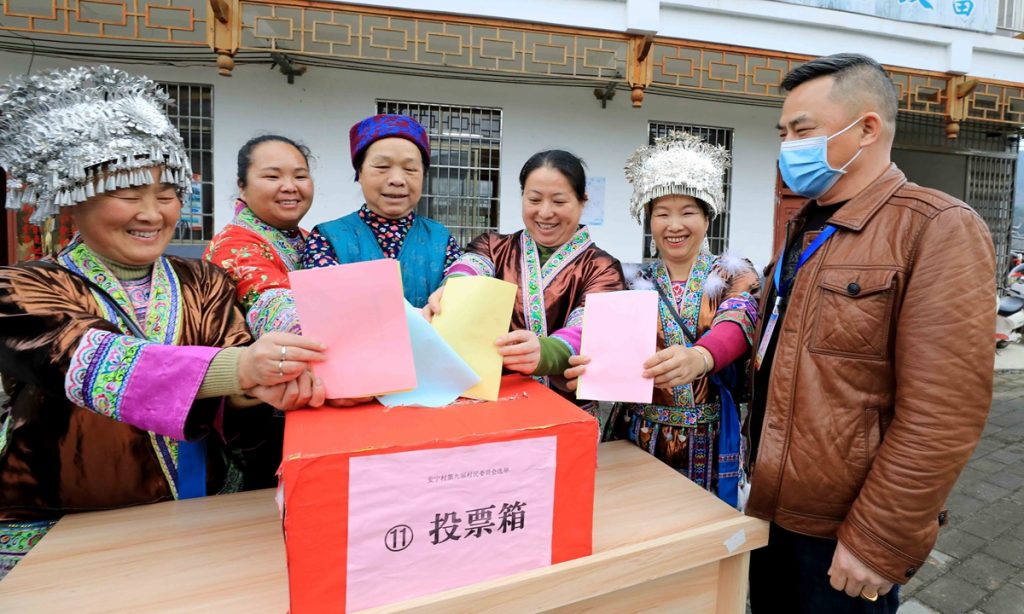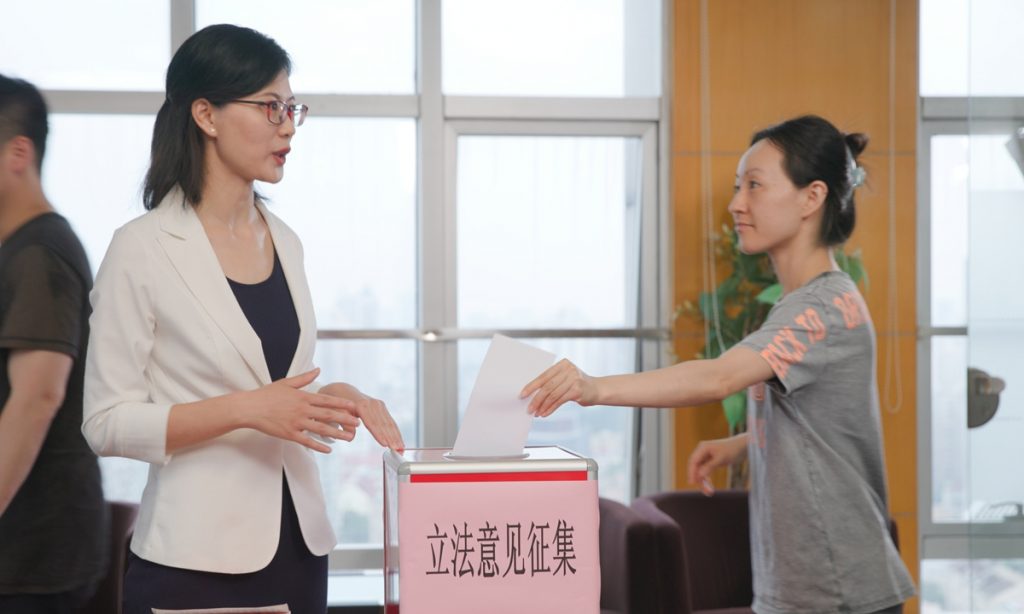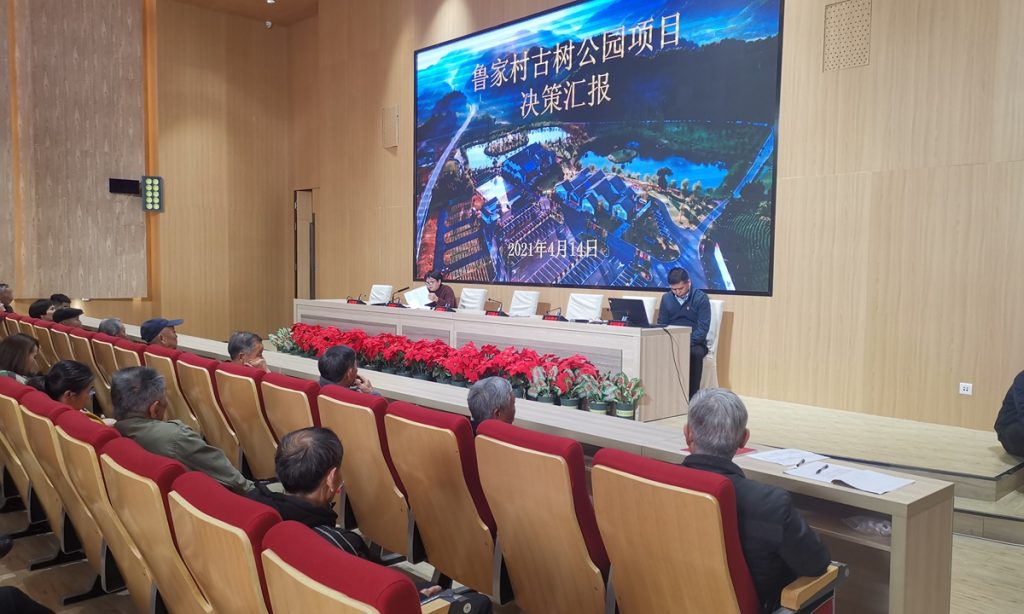Published: August 16,2022
By Huang Lanlan

Some ethnic Miao women vote to elect village officials in Anning village, Liuzhou of Southwest China’s Guangxi ZhuangAutonomous Region on February 8, 2021. Photo: VCG
Who is the Communist Party of China (CPC)? What is the CPC’s role in the new era? The CPC has grown into one of the largest parties in the world in the process of leading the Chinese people to seek liberation and happiness, making China as strong and prosperous as it is today.
As a large political party with more than 96 million members, the CPC will convene its 20th National Congress in the second half of the year, which is expected to guide the country’s development and policymaking.
Ahead of the meeting, the Global Times is publishing a series of stories to help the world understand the CPC in the new era, through the stories of CPC members working on the frontlines of various areas, as well as through the observations made by renowned scholars.
In this story, two CPC members from downtown Shanghai and a village in East China’s Zhejiang Province, respectively, share their experiences of participating in the practices of whole-process people’s democracy, and their observations on how it is benefiting people under the Party’s leadership.
Voices be heard
At a civic center in Shanghai’s downtown Hongqiaosub-district, a cabinet displays to visitors booklets of China’s laws and notes on soliciting people’s opinions on draft laws. As one of China’s first set of four national grassroots-level legislation contact points in use by the Legislative Affairs Commission of the Standing Committee of the National People’s Congress (NPC), the Hongqiao neighborhood has solicited opinions from residents on more than 60 draft laws over the last seven years.
With several hundred “legislative coordinators” who voluntarily collect and sort through these grassroots opinions, the station in Hongqiao has submitted some 1,000 suggestions on the country’s various draft laws to the NPC, more than 90 of which have been adopted.
At the Hongqiao contact station, the 420 “legislative coordinators” who work on a voluntary basis are from all walks of life, from teenage students to octogenarians, according to one of the legislative coordinators Wu Xinhui, a 37-year-old lawyer in Shanghai.
“We serve as a bridge that directly links China’s top legislature to the general public,” she told the Global Times.
Becoming a legislative coordinator in 2015, Wu, with her law background, has participated in most of Hongqiao’s opinion soliciting work on the draft laws that are closely related to people’s daily lives and vital interests, such as the Anti-Domestic Violence Law, the Law on the Protection of Minors, and China’s first-ever Civil Code.
The cases Wu deals with at work have inspired her to turn clients’ appeals into suggestions on the draft laws. For instance, when handling a case involving a senior citizen in her 90s who was a victim of domestic violence, Wu realized that the then draft of the Anti-Domestic Violence Law, though having given much attention to children and women, did not take fully into account senior citizens who might also be targets of violence.
Wu then proposed that elderly people suffering from domestic violence should be given special protection at a consultation meeting in September 2015.The NPC later adopted the amendment.
In another case several years ago, two old ladies consulted Wu on the designation of a guardian by testament, which was in a state of legal limbo in China before the Civil Code was passed and implemented. “I suggested that they write down whoever they hoped to be their legal guardian after incapacitation, and notarize the written document in the notary office,” Wu recalled. “That could be a reference for the court (if disputes occurred) in the future.”
The way Wu suggested the old ladies deal with the guardian designation issue was also adopted by the NPC in guardianship-related articles in the Civil Code. “These amendments are from everyday life, and they are in line with people’s actual needs,” Wu said.
To better collect public opinions on the draft laws, legislative coordinators including Wu also regularly go to residential communities, office buildings, and schools to talk to the people.

Wu Xinhui (left) works at the civic center in Shanghai’s downtown Hongqiao. Photo: Courtesy of Wu
“When I solicit opinions on the Draft Company Law, I hold an hour-long discussion at noon in offices, inviting company representatives and employees to talk about their ideas and suggestions,” Wu said.
Data showed that, including the station in Shanghai’s Hongqiao, the NPC had set up 22 national grassroots-level stations of contact for legislation between 2015 and July 2021, covering two thirds of Chinese provinces.
As an initiative by the country and the CPC to diversify channels for lawmakers to hear from the people, the grassroots-level legislation contact mechanism have been found to better encourage the general public to participate in the country’s legislative efforts, and let the laws and policies better respond to the will of the people. “That is a good embodiment of China’s whole-process people’s democracy,” Wu said.
The term “whole-process people’s democracy” was first proposed by General Secretary of the CPC Central Committee and President Xi Jinping during an inspection tour of the Hongqiao station of contact for legislation in November 2019. At the station, Wu reported to Xi on their works of collecting and submitting grassroots public opinions on draft laws, as well as popularizing laws among the public.
“We are marching on a political development road of socialism with Chinese characteristics, and our people’s democracy is a whole-process people’s democracy,” Xi stressed at the station.
Wu, an experienced legislative coordinator and a CPC member, said she has witnessed how China’s democracy and legislation systems have kept improving over the last decade under the guidance of the Party.
“The (legislative) process is getting smoother and increasingly transparent, and there are an increasing number of platforms and channels that enable the voices of people – including vulnerable groups – to be directly heard by top lawmakers and central authorities,” she told the Global Times.
Wide participation
Under the Party’s strong leadership, the whole-process people’s democracy is well practiced not only in modern metropolises like Shanghai, but also in China’s less-developed villages and towns, observers found.
At a CPC sharing event in April 2021, several ambassadors to China and nearly 400 political party representatives from more than 70 countries took a closer look at China’s community-level self-governance system – one example of the country’s grassroots democracy – through watching a compelling livestream of villagers in Zhejiang voting to build a park.
In the livestream, Lujiacun village showed how it decides affairs through holding villager congresses: More than 70 representatives selected from Lujiacun’s2,300 villagers attended the congress, listening to the village cadres’ report on the project on building an old arboreal park, asking the cadres questions about the report, and then voting for or against the plan by a show of hands.
At the congress, the village cadres answered questions raised by representatives in detail, such as on the budget of the building project, and the potential economic and social benefit the park may bring them. The project was eventually passed with over 70 votes in favor, 0 against, and 1 abstention.
“We did the livestream to show how China’s grassroots like our village deal with issues that concern the interests of local people,” Zhu Renbin, Party secretary of Lujiacun village, told the Global Times back in June.
Now the old arboreal park project has been completed, and the park has become a new place of leisure for local villagers, Zhu said, giving an update on the new development.
Apart from the old tree park construction, the village handles all its plans and projects in various aspects including road construction, drainage upgrades, and landscaping, through holding villager congresses, Zhu said. “Whether passed or not, they are all decided upon by villager representatives’ votes,” he noted.
The villager’s congress is regularly held in Lujiacunvillage at least once a month. At the congress, the village’s seven cadres, including Zhu, discuss various matters with the village representatives, and ask for their consent or suggestions.

Lujiacun villagers vote for the plan to build an old arboreal park in April 2021. Photo: Courtesy of Zhu Renbin
Zhu gave an example of a congress the village held recently that discussed whether to lay turf on a local public kindergarten’s playground. The village cadres introduced the project plan they designed in advance at the congress.
“Some village representatives asked, ‘why is it necessary or useful to lay turf at a kindergarten,’ or ‘how much money will the project cost,'” Zhu recalled, saying these were not difficult questions to answer. “Usually, before we introduce a plan at the villager’s congress, we will have collected advice from many villagers, and will have improved upon the plan based on the available advice.”
In Lujiacun, both the seven village cadres and the 70 plus village representatives are elected by all the local villagers through a “one man one vote” mechanism. Anyone who observes law and discipline, takes care of the neighborhood, and is active in participating in the village’s public affairs can become a candidate through either recommendation by others or self-recommendation, Zhu explained. The terms for cadres and representatives are both five years.
An election document the Global Times received from the village reads that, it “encourages women, and college graduates with more than one year of grassroots working experience” to nominate themselves to be elected as village cadres.
This community-level self-governance system, which encourages residents to elect local cadres and representatives, and to vote for or against the proposed solutions for issues in their communities, is widely practiced in tens of thousands of villages across China besides Lujiacun.
“There is no such thing as the public affairs concerning a village being privately decided upon by one or two people,” Zhu told the Global Times. “By better practicing whole-process people’s democracy, we welcome our villagers to know about and participate in every step of decision making in our village, which also grants them a sense of belonging, fulfillment, and happiness.”
globaltimes.cn
 Africa -China Review Africa -China Cooperation and Transformation
Africa -China Review Africa -China Cooperation and Transformation
